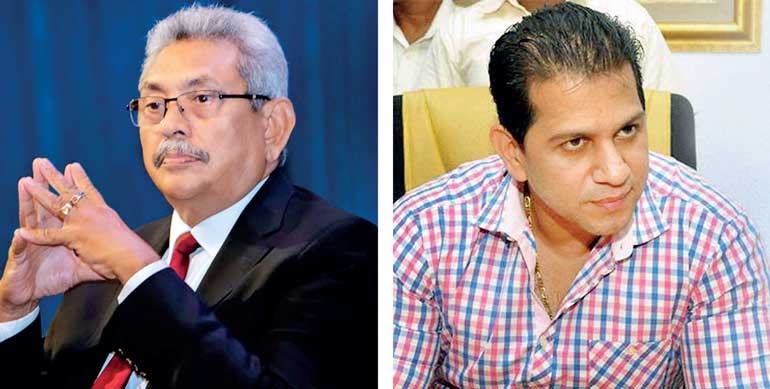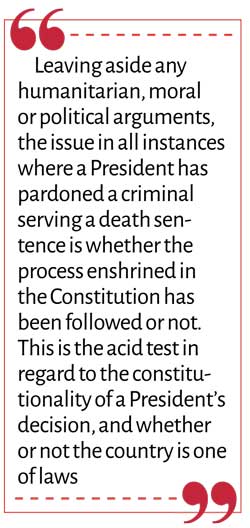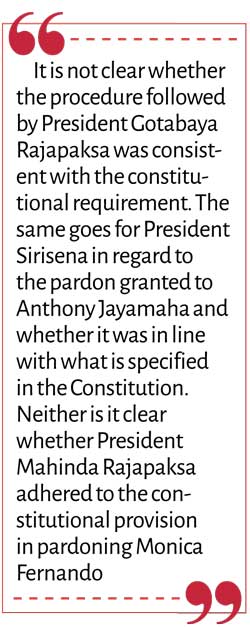Thursday Feb 19, 2026
Thursday Feb 19, 2026
Tuesday, 20 July 2021 00:35 - - {{hitsCtrl.values.hits}}

The controversy with presidential pardons has arisen again following President Gotabaya Rajapaksa’s pardoning of former MP Duminda Silva who had been convicted for murder and sentenced to death by a High Court and the sentence unanimously ratified by the Supreme Court
All animals are equal but some are more equal than others
– George Orwell –
 Presidential pardons in Sri Lanka seem to have conferred a constitutional privilege for some citizens to be more equal than others, even for those convicted of murder by the highest court in the country, the Supreme Court.
Presidential pardons in Sri Lanka seem to have conferred a constitutional privilege for some citizens to be more equal than others, even for those convicted of murder by the highest court in the country, the Supreme Court.
Another feature associated with these pardons is that politicians from the major parties do not make much noise over these compared to other comparatively less important issues for which they protest, march the streets and go berserk on social media.
The Constitution
The Constitution of the country permits the President to grant pardons for convicted criminals. The relevant clause is noted below:
“34. (1) The President may in the case of any offender convicted of any offence in any court within the Republic of Sri Lanka – (a) grant a pardon, either free or subject to lawful conditions; (b) grant any respite, either indefinite for such period as the President may think fit, of the execution of any sentence passed on such offender; (c) substitute a less severe form of punishment for any punishment imposed on such offender; or (d) remit the whole or any part of any punishment imposed or of any penalty or forfeiture otherwise due to the Republic on account of such offence:
“Provided that where any offender shall have been condemned to suffer death by the sentence of any court, the President shall cause a report to be made to him by the Judge who tried the case and shall forward such report to the Attorney-General with instructions that after the Attorney-General has advised thereon, the report shall be sent together with the Attorney-General’s advice to the Minister in charge of the subject of Justice, who shall forward the report with his recommendation to the President.”
 Acid test
Acid test
While the President of the country has the power to pardon, in the case of any person serving a death sentence, the above caveat requires the President to cause a report to be made to him by the Judge who tried the case and shall forward such report to the Attorney-General with instructions that after the Attorney-General has advised thereon, the report shall be sent together with the Attorney-General’s advice to the Minister in charge of the subject of Justice, who shall forward the report with his recommendation to the President.
Leaving aside any humanitarian, moral or political arguments, the issue in all instances where a President has pardoned a criminal serving a death sentence is whether the above process enshrined in the Constitution has been followed or not. This is the acid test in regard to the constitutionality of a President’s decision, and whether or not the country is one of laws.
The clause however does not extend to criminals serving other sentences, and in this regard it appears that the Executive President has an unfettered power to pardon criminals who have committed crimes for which they have not been served a death sentence. It is time perhaps that society questioned this power granted to one individual and commenced a discussion on a procedure that should be followed prior to granting a pardon to any convict serving a sentence imposed by the Courts.
Presidential pardons are nothing new, in Sri Lanka and in several other countries, and they have been granted without controversy and with much controversy. The real issue is whether there is a process in place for one person to effectively over rule a decision made even by the highest court in a country.
Some countries have empowered their judiciaries to review executive pardons. For instance, in the United Kingdom, the courts have the jurisdiction to review the exercise of the Royal Prerogative of Mercy by the monarch (on advice of the justice secretary) ‘in accord with accepted public law principles’. Thus, in the United Kingdom, the power to grant pardons does not go un-checked. Meanwhile, in India, through the landmark case of Epuru Sudhakar & Anor v. Government of Andhra Pradesh & Ors, the Indian Supreme Court held that it has jurisdiction to judicially review the pardoning power of the president.
 Controversial pardons
Controversial pardons
The controversy with presidential pardons has arisen again following President Gotabaya Rajapaksa’s pardoning of former MP Duminda Silva who had been convicted for murder and sentenced to death by a High Court and the sentence unanimously ratified by the Supreme Court.
Ahalya Lelwala, a Research Assistant attached to the Legal Research team at Verité Research, an interdisciplinary think tank that provides strategic analysis and advice for governments and the private sector in Asia, writing in Verite Research on 21 July 2020 (https://www.veriteresearch.org/2020/07/21/presidential-pardons-in-sri-lanka-an-unchecked-executive-power/), says: “On 26 March 2020, President Gotabaya Rajapaksa granted a presidential pardon to former Lance Corporal Sunil Ratnayake, a prisoner on death row for the murder of eight persons in Mirusuvil in 2000. Ratnayake was sentenced to death by a Trial-at-Bar bench of the Colombo High Court in June 2015. In the case of Rathnayake Mudiyanselage Sunil Ratnayake Vs Hon. Attorney General, SC TAB 01/2016, decided in April 2019, a five-judge bench of the Supreme Court affirmed this sentence.
“Former President Maithripala Sirisena granted two such presidential pardons during his term in office. In May 2019, he pardoned secretary general of the militant Sinhala-Buddhist group Bodu Bala Sena, Venerable Galagoda Aththe Gnanasara Thera.
“The Thera was serving a six-year prison sentence for contempt of court imposed by the Court of Appeal in August 2018 (Galagodaaththe Gnanasara Vs Hon. Attorney General, CA (CC) Application No. 04/2016). His subsequent appeals against the prison sentence filed in the Court of Appeal and Supreme Court were dismissed.
“The second pardon by President Sirisena was granted on 9 November 2019 to Don Shramantha Jude Anthony Jayamaha, who was sentenced to death in the Royal Park Murder case by the Court of Appeal in 2012. The Supreme Court in 2014 affirmed this sentence. The President’s pardon was reportedly on the basis of requests made by the Buddhist clergy, and other parties, including the considering of reports prepared by the Prisons Department and several other State institutions.
“Mary Juliet Monica Fernando, the wife of a former Minister of Parliament had been sentenced to death for a double murder in 2005. Subsequently, on International Women’s Day in March 2009, former President Mahinda Rajapaksa granted her a presidential pardon.
“In addition to the above high-profile pardons, Sri Lankan presidents have routinely granted mass scale pardons to persons convicted of minor offences. These pardons are usually granted on special days, such as Independence day, Vesak day and Christmas.”
It is not clear whether the procedure followed by President Gotabaya Rajapaksa was consistent with the constitutional requirement. The same goes for President Sirisena in regard to the pardon granted to Anthony Jayamaha and whether it was in line with what is specified in the Constitution. Neither is it clear whether President Mahinda Rajapaksa adhered to the constitutional provision in pardoning Monica Fernando.
Politically motivated
Previous Presidents have granted pardons to convicted criminals too. Lakdev Liyanagama writing in the Daily News on 30 May 2019 cites what he states as perhaps one of the first Presidential pardons to raise concern, that of Sunil Perera, better known as ‘Gonawela Sunil’ who was serving a sentence for rape. Perera, who had close links with the United National Party (UNP) was granted a pardon by then President J. R. Jayewardene.
Liyanagama also mentions President Ranasinghe Premadasa pardoning Manohari Daniels, who was convicted of aiding and abetting the Liberation Tigers of Tamil Eelam (LTTE) to carry out a bomb attack opposite Zahira College, Maradana in 1987 that killed 40 persons. Daniels was pardoned at a time when the Premadasa government was having ‘peace talks’ with the LTTE, as a gesture of goodwill in what was a bid to ensure the talks succeeded.
Several newspaper reports mentions that in April 2014, 10 former PSD officers were released from prison as they were granted Presidential Pardons by President Mahinda Rajapaksa.
The Panadura High Court Judge, Kusala Sarojani Weerawardana, had found these 10 Presidential Security Division (PSD) officers who were accused of assaulting two famous songsters Rookantha Gunathilike and Chandraleka Perera to be guilty of the charges and sentenced them to four-and-a-half years of rigorous imprisonment.
The PSD officers had entered the living premises of the two famous singers, shaved their heads and assaulted them in the year 2000. The PSD officers allegedly did this due to the two singers participating publically at an opposition UNP political rally. The attack on the two singers was political revenge for them participating in the Opposition rally.
At the time of the attack Chandrika Kumaratunga was the Executive President. The Presidential Security Division had acquired a not-so-dignified reputation during this time as they were allegedly used for political attacks on opponents of the Government.
There cannot be any doubt that the presidential pardons mentioned were nothing but politically motivated actions on the part of the executive and the political party he or she represents. The privilege of being pardoned would not be extended to others in the death row who do not belong to the elite club of persons who have in common the motto, “it is who you know and not what you know that matters”.
Death sentences
Death sentences are looked at as archaic and medieval by many as the belief that an eye for eye practice is not an act of meting out justice in this day and age. Neither is there any conclusive evidence that that passing a death sentence on anyone has deterred other persons from committing offences punishable by such a sentence.
In a detailed study carried out by the Australian Broadcasting Corporation in 2015 titled ‘Fact check: No proof the death penalty prevents crime’ (https://www.abc.net.au/news/2015-02-26/fact-check3a-does-the-death-penalty), it states clearly that there is no conclusive evidence that the death sentence has acted as a homicide deterrent.
Amnesty international reports that there are around 20,000 persons who are in the death row throughout the world.
In an article by Max Roser and Hannah Ritchie in the website Ourworld in Data in 2019, states that more than 400,000 people die from homicide each year – in some countries it’s one of the leading causes.
Inequalities and tyrannies
A citation taken from an Oxford School Education Blog is worth repeating here to illustrate what some may interpret as a simile in the political administration of the country: “In George Orwell’s allegorical novel ‘Animal Farm,’ animals conspire to take control of their farm from humans, establishing ‘Animalist’ commandments to prevent the reproduction of the oppressive behaviour of humans. Unfortunately, as time goes on that is exactly what happens and the pig Napoleon ends up changing the final rule of ‘All animals are equal’ so that it reads that ‘All animals are equal but some animals are more equal than others’. This is a parody of Stalinist Russia which Orwell was criticising.”
In Sri Lanka, not of course dissimilar in other democratic countries, the parody of Stalinist Russia perhaps is alive and well as people vote in one party to replace another in order to, as the blog says “create their vision of a Utopian society, only for it to become another group’s dystopia”. The blog goes on to say “the way a society is structured may change but human nature does not necessarily follow suit. Thomas Hobbes viewed human life as ‘nasty, brutish and short’ and therefore we should perhaps not be surprised if time and time again we replicate previous inequalities and tyrannies with only a change of ‘players’.”
‘Animal Farm’ illustrates this. Some might say the general public will continue to have the same wine in different bottles irrespective of a change of guard at an election.
It’s who you know?
Court decisions are not always right, and there have been many miscarriages of justice throughout the world. While a person with wealth, and right connections, will always have a chance of some redress, like a pardon, and perhaps even a retrial on discovery of new evidence, most convicted persons have no recourse to such a process as their case will not generate any interest, and they will languish in jail for the duration of their sentences or be executed in countries where death sentences are carried out.
No doubt there are many instances where a person accused, tried and convicted of murder maintains their innocence, and they are justly or unjustly convicted and sentenced to death or a life imprisonment. Justice will be meted out in a law enforcement and judicial system that functions efficiently, effectively and impartially, free of political interference and free of “inducements”.
There is a question mark whether any country could boast of having a perfect system where all of above are met in all instances by everyone engaged in law enforcement and justice. Consequently, there is the possibility of some persons being executed or committed to life in prison for a crime they never committed.
A judicial review process even beyond the highest court in the land, may be an avenue that could be considered although the parameters of such a process would be extremely hard to implement. A presidential pardon system maybe one such avenue, but it has to include a formal review process and some parameters as to who should be subject to such a review process.
Clearly, such a process cannot include political favourites at the expense of others who do not subscribe to the motto “it is who you know and not what you know that matters”. Of course in an imperfect society riddled with corruption and other vices, what one knows might lead them to persons of influence and power and a consequential symbiotic existence.